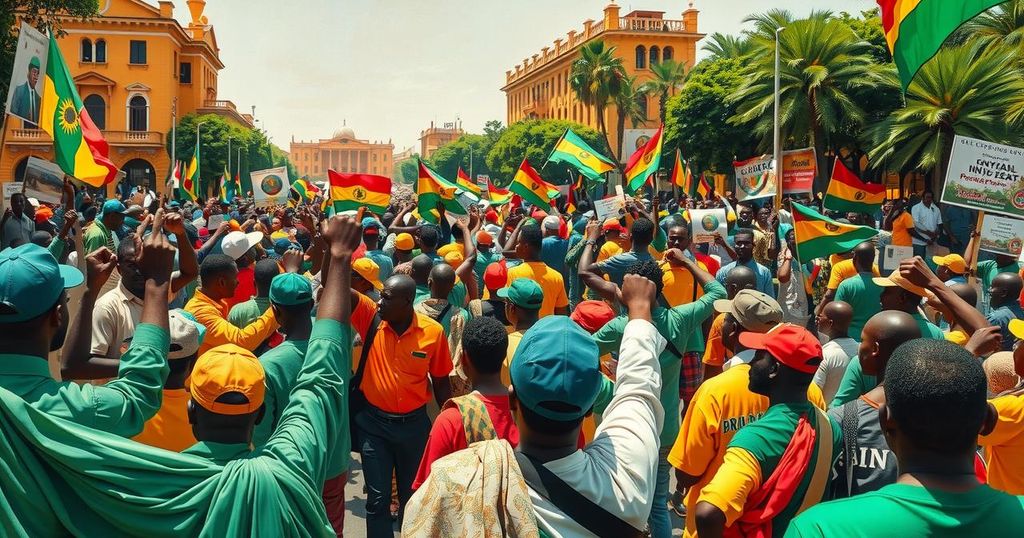Mali is witnessing rising protests against Colonel Assimi Goita’s military government, sparked by a constitutional proposal intending to extend his leadership until 2030. Previous public support for the Colonel has waned as promises of stability and elections remain unfulfilled. Recent unrest reflects deepening frustrations among citizens, who now experience escalating violence and repression, while the military faces growing backlash. Experts warn that dialogue is needed to prevent further instability and civilian suffering.
Malians have recently taken to the streets in protest against their military government’s actions, which many see as a blatant attempt to cling to power. This sudden burst of public discontent was sparked by a proposal made at a national conference suggesting Colonel Assimi Goita lead the nation until 2030, essentially sidelining political parties entirely. The growing unrest is emblematic of the discontent brewing among citizens as the military continues to suppress democratic activity.
When Goita came to power in a coup in 2020, he was welcomed with open arms by a population fed up with instability and violence from armed groups. Yet, nearly five years later, his administration has mostly failed to deliver on promises for elections and safety. Rather than seeing improvements, Mali has experienced a continuation of violence—often at the hands of government forces—and protesters are now voicing their frustrations more openly than before.
On May 3, demonstrators gathered in Bamako, sending a clear message of dissent by raising their fists in solidarity against Goita’s proposed constitutional changes. Eyewitnesses noted the tense atmosphere at the Cultural Palace, where counter-protests erupted as pro-military factions clashed with anti-government demonstrators. This rising division suggests the potential for escalated conflict, especially with echoes of past violent crackdowns fresh in collective memory.
As Ousmane Diallo of Amnesty International pointed out, even initial supporters of Goita have reached their breaking point: “For many people… this is a step too far. They see it as Goita trying to consolidate and hold on to power, and they have resolved to stand against it.”
The backdrop of this tension includes a history of Goita’s broken promises. He first rose to power amid widespread protests and an escalating security crisis stemming from insurgent groups in northern Mali. Initially, his government vowed to hold elections and restore stability, but after multiple delays and a second coup in 2021, the fragile hope for democracy has all but evaporated.
Analysis indicates that while some citizens might still support Goita due to perceived security gains against armed groups, this support could collapse. Many view the increased military confrontations as having detrimental effects on civilians, who suffer most from government-led offensives. Reports have emerged of extrajudicial killings and the targeting of ethnic groups believed to support insurgents.
In a recent development, Russian mercenaries from the Wagner group have become involved in Mali’s fight against insurgent forces. While some argue these fighters have stabilized certain areas, this collaboration raises ethical concerns, especially as reports of civilian casualties have also spiked. Ulf Laessing from the Konrad Adenauer Stiftung commented on this complexity, stating that while there are some improvements, vast swathes of the country remain dangerously unstable.
Tensions reached a peak with the fall of Kidal earlier this year, a stronghold once controlled by Tuareg rebels. Proponents of Goita assert that such victories validate the military’s extended rule, while critics argue it’s simply an excuse for retaining power indefinitely. Human Rights Watch has documented alarming human rights abuses surrounding military operations, highlighting a trend that sees civilians caught in the crossfire of a prolonged conflict.
The UN reports a staggering 3.3 million people displaced across Mali and its neighbors due to continuous violence. Analysts cautioned that while military action has its place, without a strategic dialogue or a compromise, the situation in Mali could worsen. Only through addressing underlying issues can Mali begin to heal and rebuild, moving beyond the military approach that’s sown division and distress among its citizens.
Malian protests against Colonel Goita’s military government signify a vital discontent among citizens who feel increasingly marginalized. The promises made in 2020 now seem like distant memories, as many grapple with increasing violence and diminished political freedom. With military rule potentially solidifying, experts underscore the urgent need for dialogue and a return to democratic processes to mitigate further suffering and instability in the region.
Original Source: www.aljazeera.com






